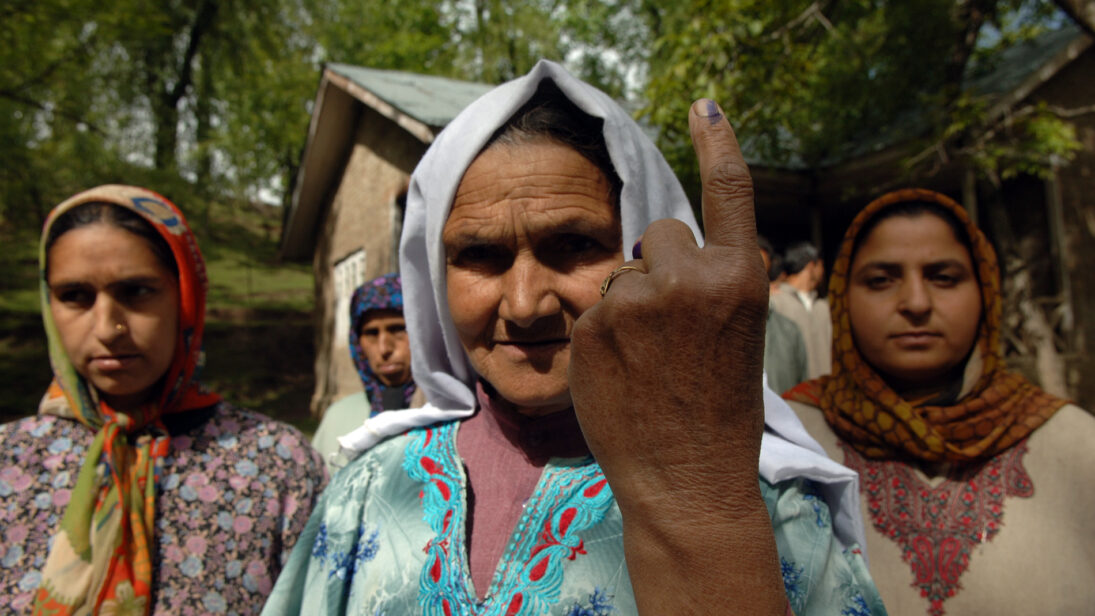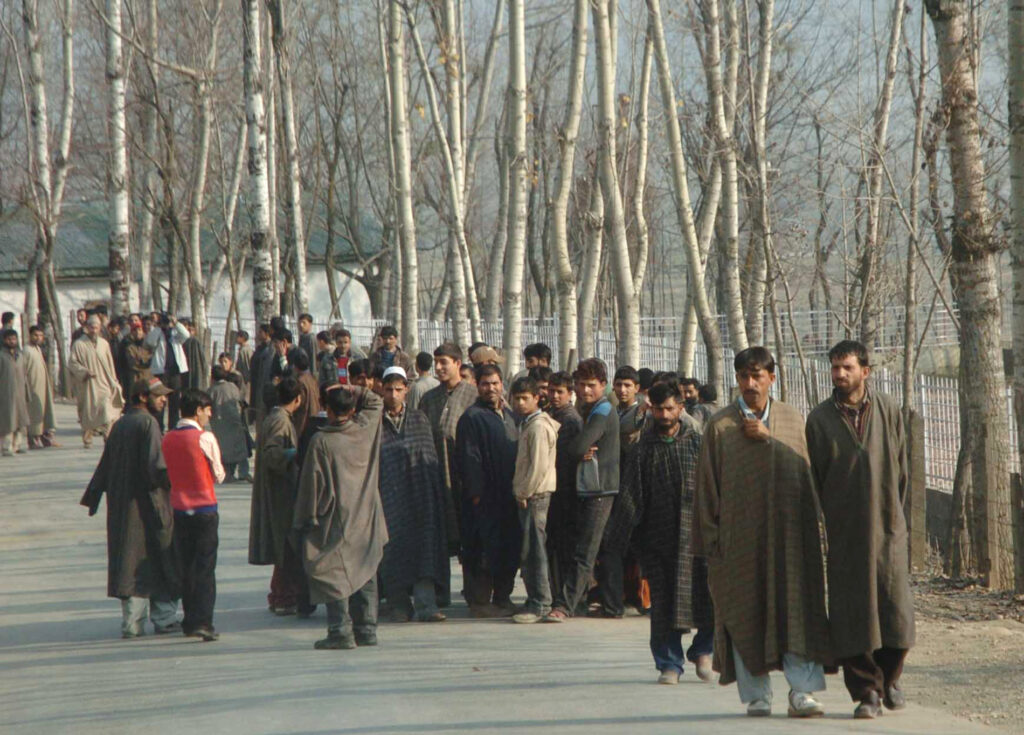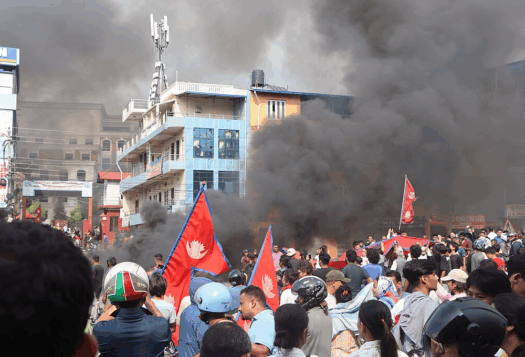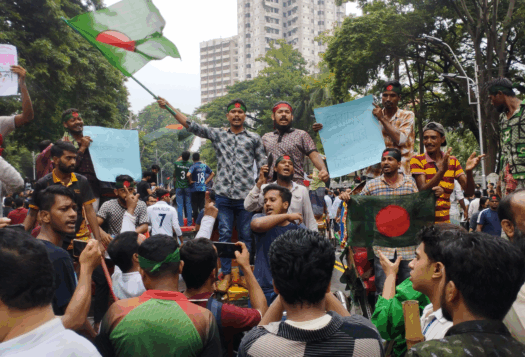
A series of political developments following the revocation of Articles 370 and 35A on August 5, 2019, have plunged Jammu and Kashmir’s traditional parties—known for their advocacy on Kashmir’s special status and identity—into a deep existential crisis. Hirdesh Kumar, Jammu and Kashmir’s chief electoral officer, sent shockwaves after he recently stated that at least 2.5 million new voters, including non-local residents, would be enrolled to vote in the next assembly election in the Union Territory (UT).
The Bharatiya Janata Party (BJP) described the revocation of the special status of the former state as a complete integration of Jammu and Kashmir with the rest of India. However, the BJP’s ‘New Kashmir’ slogan has also sought to establish a new political order that suits the party’s national interests.
Though similar attempts have been made by Congress-led central governments in the past, the new political structure introduced by the Modi government has completely subverted the old political model of the special constitutional status of J&K.
The new political order involves not just renewed political processes but also new political parties, leadership, and classes. Considering these new developments, if the BJP’s machinations successfully form a government after the Union Territory’s first assembly election, it will be seen as a victory for the party’s Hindu nationalism in Kashmir.
Article 370 and its Consequences for J&K’s Elections
Among other central laws, the revocation of J&K’s special constitutional status paved the way for the renewed applicability of the 1951 Representation of the People Act, which allows non-local voters, especially central government employees and migrant laborers, to vote in assembly elections.
Following an uproar, the UT administration refuted the news reports about the potential addition of new voters as “misleading.” However, such statements haven’t allayed the fears of mainstream opposition parties, such as the National Conference (NC), Congress, the People’s Democratic Party (PDP), and other pro-India political parties in Kashmir. Even after the official clarification, the Lt. Governor, Manoj Sinha, has been sending up one trial balloon after another. On October 12, the administration in Jammu first issued – and then swiftly withdrew its order – that allowed non-locals to vote in the UT’s assembly election. Opposition parties alleged that the ruling BJP could use the electoral roll revision as a weapon to manipulate the election.
In the former state, the last delimitation exercise was conducted under President’s Rule in 1995, based on the 1985 Census. Undertaken by an independent body called the Delimitation Commission constituted by the Indian Parliament, the process entailed drawing and delimiting electoral constituencies in Jammu and Kashmir. In 2002, the government of then Chief Minister Farooq Abdullah brought a freeze on the delimitation of assembly constituencies till 2026. This established the hegemony of Kashmiri leaders in the former state’s assembly, where Kashmir had 46 seats, Jammu 37, and Ladakh four.
After the former state lost its special constitutional status in 2019, the freeze on the delimitation of assembly constituencies also became irrelevant. In Jammu and Ladakh, it is widely alleged that the special status was selectively used by previous governments to benefit the Kashmir region politically and economically. Except for the cabinet of Ghulam Nabi Azad, the former state always had a majority of its cabinet ministers from the Kashmir Valley and has never had a chief minister from the Jammu or Ladakh regions.
In Jammu, Articles 370 and 35A were largely seen as pro-Kashmir, as they allegedly facilitated regional discrimination against the Jammu region, which did not have many proponents of Kashmiri ethnic nationalism and separatism. In Jammu, these constitutional provisions led to a denial of citizenship rights to about 9000 families, including Hindu and Sikh refugees from Pakistan and Dalit families from Punjab employed as sanitation workers in Jammu and Kashmir for the past over 60 years.
The Current State of Electoral Politics in J&K
In conjunction with the BJP’s longstanding demand to redress the asymmetry in political representation between Kashmir and Jammu, the delimitation commission has redrawn electoral constituencies based on the 2011 Census. As per the new delimitation order dated May 5, 2022, the number of assembly seats has increased. Of the total 90 assembly constituencies in the region, 43 will be part of the Jammu region, and 47 will be part of the Kashmir region. Therefore, while the population of Kashmir is larger than Jammu, the delimitation commission has proposed the addition of six new assembly seats in Jammu but only one in Kashmir. The delimitation commission has also recommended the reservation of assembly seats for displaced persons from Pakistan-administered-Jammu and Kashmir, as well as for militancy-affected migrants from Kashmir. All major Kashmiri political parties except for the BJP have criticized the delimitation panel’s final report.

On September 10, National Conference (NC) chief Farooq Abdullah, who has been a three-time chief minister of the former state, held an all-party meeting to discuss the reported inclusion of nonlocal voters. Though Jammu based political parties with little electoral strength did participate, Kashmir-based parties like Sajjad Gani Lone’s People’s Conference and Altaf Bukhari’s Apni Party didn’t attend the meeting, demonstrating disunity among Kashmir-centric parties.
J&K has been under Central rule since the BJP-PDP coalition government collapsed in June 2018. In the highly-polarized political environment post-August 5, 2019, there has been a dramatic emergence of new political parties and the poaching of leaders from principal opposition parties like NC, PDP, and Congress—who were kept under house arrest for several months following the revocation of J&K’s special status. This combination of factors could ultimately strengthen the BJP’s chances during the next election.
Implications of Future Elections in J&K: Furthering the BJP’s Nationalism
Several new political parties have emerged in Kashmir. Former J&K chief minister Ghulam Nabi Azad has floated his own party: the Democratic Azad Party. Having maintained a cautious silence on BJP policies in Kashmir previously, he has made a U-turn on restoring J&K’s special status and stressing in public rallies that these constitutional provisions are unlikely to return.
Meanwhile, there have been cordial exchanges between NC leader and former chief minister Omar Abdullah and Jammu and Kashmir BJP chief, seen as a kind of backdoor patch-up between the two parties. In August this year, the NC hinted that it would contest future assembly polls on its own and will not have a prepoll alliance with any constituent parties of the People’s Alliance for the Gupkar Declaration, an amalgam of traditional mainstream Kashmir-centric parties.
The amalgam exists for the restoration of the erstwhile state’s special status. With nothing to lose, the PDP, unlike the NC, continues to be a bitter critic of the Modi government’s Kashmir policies.
While the BJP-led central government can’t afford to have a hostile government after the first assembly election in UT, it has started to woo communities disillusioned with the traditional parties. Besides its core Hindu voters, the BJP is eying the votes of Muslim tribal and Pahari communities. Incidentally, the BJP leaders have discussed installing a Hindu chief minister in the Muslim-majority Union Territory. Amid targeted killings of Kashmiri Pandits and non-local migrant laborers, concerted efforts to renovate old Hindu temples and shrines, the renaming of public places and institutions, and declaring Maharaja Hari Singh’s birth anniversary a public holiday after dropping Martyr’s Day and Sheikh Abdullah’s birth anniversary from the list, are a part of the cultural-political interventions. In this way, the BJP’s Kashmir conquest, just like the Pulwama-Balakot crisis, the redevelopment of the Kashi-Vishwanath Corridor in Banaras, and the scheduled inauguration of the Ram temple in Ayodhya, is expected to go straight to the heart of the party’s poll pitch for the 2024 parliamentary elections.
***
Image 1: Public.Resource.Org via Flickr
Image 2: Public.Resource.Org via Flickr


